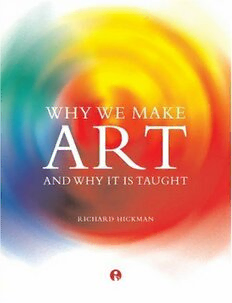Download Why We Make Art: And Why It Is Taught PDF Free - Full Version
Download Why We Make Art: And Why It Is Taught by Richard Hickman in PDF format completely FREE. No registration required, no payment needed. Get instant access to this valuable resource on PDFdrive.to!
About Why We Make Art: And Why It Is Taught
Does art have any use or real purpose in today’s society? Why do governments around the world spend millions on art education? Rejecting the vogue for social and cultural accounts of the nature of art-making, this book is largely psychological in its approach to discussing art-making and its place in education. The ‘we’ in the title is intentionally polemical, with the author claiming a universal, i.e. pan-cultural basis for ‘art’-making activities - or rather activities which can be described as ‘creating aesthetic significance’. Developmental issues in art education are examined, together with the nature of learning in art, with reference to concept acquisition. Section two of the four sections which comprise the book, focuses upon some ‘mini case-studies’, detailing conversations with people talking about their art-making, together with some autobiographical reflections. Section three then considers the issues in art and learning which can be gleaned from various respondents’ accounts of their making activities; these include the nature of the artistic personality and the role of art in self-identity and self-esteem. Other topics touched upon include imagination, expression and creativity. The concluding section examines the notion of creating aesthetic significance as a fundamental human urge, drawing upon work done in evolutionary psychology. Whilst questioning whether schools as they are currently conceived are the best places for teaching and learning anything, an art curriculum based upon the acquisition of ‘threshold skills’, such as drawing, together with a gradual introduction to the appreciation of visual form is advocated. Declaring that schools of the early twenty-first century will soon be seen as as dated as the Victorian workhouse, the successful art room, with a learner-centred rather than discipline-centred philosophy is put forward as a model for schools and schooling.
Detailed Information
| Author: | Richard Hickman |
|---|---|
| Publication Year: | 2005 |
| ISBN: | 9781841509297 |
| Pages: | 178 |
| Language: | English |
| File Size: | 2.182 |
| Format: | |
| Price: | FREE |
Safe & Secure Download - No registration required
Why Choose PDFdrive for Your Free Why We Make Art: And Why It Is Taught Download?
- 100% Free: No hidden fees or subscriptions required for one book every day.
- No Registration: Immediate access is available without creating accounts for one book every day.
- Safe and Secure: Clean downloads without malware or viruses
- Multiple Formats: PDF, MOBI, Mpub,... optimized for all devices
- Educational Resource: Supporting knowledge sharing and learning
Frequently Asked Questions
Is it really free to download Why We Make Art: And Why It Is Taught PDF?
Yes, on https://PDFdrive.to you can download Why We Make Art: And Why It Is Taught by Richard Hickman completely free. We don't require any payment, subscription, or registration to access this PDF file. For 3 books every day.
How can I read Why We Make Art: And Why It Is Taught on my mobile device?
After downloading Why We Make Art: And Why It Is Taught PDF, you can open it with any PDF reader app on your phone or tablet. We recommend using Adobe Acrobat Reader, Apple Books, or Google Play Books for the best reading experience.
Is this the full version of Why We Make Art: And Why It Is Taught?
Yes, this is the complete PDF version of Why We Make Art: And Why It Is Taught by Richard Hickman. You will be able to read the entire content as in the printed version without missing any pages.
Is it legal to download Why We Make Art: And Why It Is Taught PDF for free?
https://PDFdrive.to provides links to free educational resources available online. We do not store any files on our servers. Please be aware of copyright laws in your country before downloading.
The materials shared are intended for research, educational, and personal use in accordance with fair use principles.

